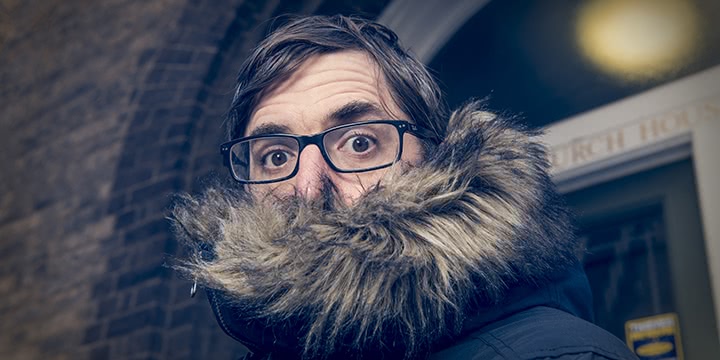Eternally curious, unabashedly forthright and driven by an unwavering dedication to the truth, Louis Theroux has spent his entire career diving into the ostracised fringes of society, determined to discover the humanity that exists behind the extreme.
He’s spent years exploring the world’s most deviant ideologies and believes the common thread that runs through them – from the radical to the repugnant – is the same hunt for purpose ingrained within us all.
“It’s a desire for one’s life to have some kind of meaning; that you are writing the script for your own life and in that script you have a type of heroic status,” Theroux says, paraphrasing German philosopher Friedrich Nietzsche. It’s apt, as both men share a healthy penchant for scepticism and humanism.
“You don’t want to stay in a room clinging to existence,” he continues. “You want to ride out on a white charger and capture the castle. In all the stories I’ve done, they are people who are making sense of their lives and putting themselves in the centre of their lives.”
The renowned British broadcaster is soon heading to Australian shores, reflecting on years of inquisitive escapades with a national speaking tour. It comes in the wake of his new cinematic release, My Scientology Movie. In his first film made for the big screen, Theroux tries to penetrate the closely guarded inner sanctum of Scientology in the hope of further understanding this distinctly American religion, which combines elements of fame, spirituality, financial acumen and UFOs.
“I’m fascinated by American celebrity culture, and Scientology has latched on early to celebrities,” says Theroux. “I’m also interested in American commercialisation, and the way in which business is combined with almost any facet of life. In essence the story is about religious extremism, but of a very weird type.”
As you might expect, Theroux’s prying nature wasn’t received well by the church. Throughout filming, he was tailed by private investigators and “self-styled reporters” who would appear unannounced, refusing to identify themselves. All the while, he was being swallowed under a mountain of litigation.
“The main thing they do is use lawyers,” says Theroux. “They send a barrage – an absolute blizzard of legal letters – from multiple law firms that is basically designed to scare you off. And it is kind of scary, to be honest with you. That’s policy with them. L. Ron Hubbard, the founder of Scientology, has put in writing that you should harass people using lawyers. The idea isn’t to win a case against you, it’s just to intimidate you and slow you down.”
As word of his project spread, Theroux was pursued by a dedicated group of Scientologists determined to turn the camera back onto him. Absurdly, and somewhat humorously, they claimed to be making a documentary of their own. This unrelenting harassment comes from only the most zealous church members, whose absolute conviction of belief is used to self-vindicate their actions.
“If you thought you had all the answers to cure insanity, crime and war, what would you not be willing to do to preserve and to spread those answers?” poses Theroux. “If you believe that you have this panacea – this universally applicable solution – there’s nothing that wouldn’t be worth doing in order to get the message out there. Fundamentally it’s a utopian, revolutionary attitude.”
With his previous documentaries, Theroux has always secured first-hand access to his subjects, stepping into the thick of the San Quentin prison, seething neo-Nazism and Hollywood’s porn industry alike. However, the Church of Scientology explicitly forbids journalists from breaching its world.
It was an obstacle that forced the filmmaker to come up with a new and creative approach. With the help of former second-in-command Scientologist Mark ‘Marty’ Rathbun, the film uses hired actors to play influential believers. The likes of Tom Cruise and church leader David Miscavige are brought to life in staged re-enactments of both insider practices and alleged abuse, exploring infamous moments from the church’s history. “The idea of re-enactments came up quite early on,” says Theroux. “Then it was a question of how you can make them something more than a gimmick that actually says something authentic and true about how Scientology is experienced by its own members and ex-members.”
For My Scientology Movie, drawing a parallel between Hollywood-style adaptation and the religion’s own show business genesis was no coincidence.
“Re-enactment is very much a part of Scientology,” Theroux says. “They famously recruit many of their young members from the acting community. L. Ron Hubbard had aspirations to be a filmmaker, and many of the drills – the techniques of self-actualisation or becoming a better communicator – rely on acting-type role play.
“The more we thought about it, it all kind of linked up and made sense. It felt like it was true to Scientology: the idea of getting actors together in LA, of shooting it exclusively in LA, and also recruiting our own little team of aspiring actors. Young, dewy-eyed, keen, go-getting male and female actors that in a parallel universe could have been potential recruits for Scientology, but in this universe became recruits for our own project.”
Throughout his career, Theroux has been able to find the humanity in even the most alien of cultures. This time around, doing so turned out to be the largest challenge of all.
“It’s quite straightforward to create a sense of empathy or a sense of connection with someone if you’re spending time with them,” he says. “Even if they’re doing something awful, you would be surprised how, after a while, if they’re reasonably nice to you and you spend a bit of time with them, it’s human nature to relate to them.
“If they are not letting you in, it’s always the opposite. You start feeling distant from them. Especially if they’re coming after you, or are filming you or following you, or sending what you take to be threatening letters. It’s a challenge to not dehumanise them. The challenge there is to maintain an openness to their virtues and see the good in them. We strenuously tried to keep that in mind and I think we managed it. In a sense, the viewer has to be the judge.”
As always has been the case for Theroux, a balanced approach is imperative. “I see it as a very relatable and very understandable impulse that leads you into the deepest part of Scientology. I try not to embrace a type of ‘them and us’ paradigm. I see Scientologists as for the most part decent people, and people who really do feel they’re doing a lot of good for the world. It’s like they say: ‘The road to hell is paved with good intentions.’ In the case of Scientology, good impulses have been put at the service of destructive results.”
Theroux has come a long way since his first documentary series in 1998, forging a name for himself as one of the most highly regarded and unique broadcasters in the industry. Throughout it all, however, has been a refusal to accept life as it first appears on the surface.
“We all in our darkest moments are capable of dreadful things,” he says. “There is no-one on God’s green Earth who doesn’t have some slither of humanity in them. The challenge for us is to try and reach out, to speak to that humanity, and see the good in people.”
The Louis Theroux Live On Stage dates areTuesday September 27, Wednesday September 28 and Sunday October 2, at the State Theatre.My Scientology Movie opens in cinemas on Thursday September 8.



































